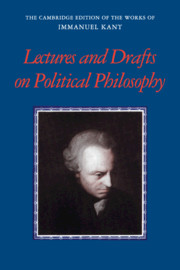Book contents
- Frontmatter
- Contents
- General Editors’ Preface
- Acknowledgments
- General Introduction
- Translators’ Remarks
- Reflections on the Philosophy of Right
- Natural Right Course Lecture Notes by Feyerabend
- Drafts for Published Works
- Drafts for Theory and Practice
- Drafts for Towards Perpetual Peace
- Drafts for the Metaphysics of Morals
- Drafts for Conflict of the Faculties
- Glossary
- Topical and Chronological Concordance
- Editorial Notes
- Index
Editor’s Introduction
Published online by Cambridge University Press: 10 December 2020
- Frontmatter
- Contents
- General Editors’ Preface
- Acknowledgments
- General Introduction
- Translators’ Remarks
- Reflections on the Philosophy of Right
- Natural Right Course Lecture Notes by Feyerabend
- Drafts for Published Works
- Drafts for Theory and Practice
- Drafts for Towards Perpetual Peace
- Drafts for the Metaphysics of Morals
- Drafts for Conflict of the Faculties
- Glossary
- Topical and Chronological Concordance
- Editorial Notes
- Index
Summary
Kant typically entered his classroom armed with very few notes. One student recounted that “In many classes he did not even once use a notebook, instead he had a few things marked in the margins of his textbooks to serve as an outline.” Kant was known for an engaging teaching style, one that aimed at getting students to think for themselves. He was required in most classes to use a textbook as the basis for his lectures, but he usually used the textbook as a sounding board and even when presenting the author's views evaluated them from his own perspective. In his lectures on ethics he was said tomove his students to tears with his exhortations to duty.We don't know whether students shed any tears in Kant's course on Natural Right, but we do know that he wrote his notes for this course in a textbook. His personal note-filled copy of the second volume of Gottfried Achenwall's Jus Naturae survived into the twentieth century and served as the core for the section of the Academy edition for Kant's Reflections on the Philosophy of Right. It was lost after the Second World War. Kant wrote in the margins of this text but did not go the lengths that he did for other textbooks which he had bound with interleaved blank pages so that he would have a full blank space opposite every page of text. The number of pages of Reflections gleaned from Kant's copy of Achenwall is further reduced by the fact that Kant's copy of the other half of Achenwall's text, which Kant must have owned given the extensive use of that volume in the Feyerabend course transcript, has been unaccounted for since Kant's death.
The basic history of the production of the Academy edition of the Reflections is explained in the General introduction to this volume of translations. Erich Adickes, the editor of part three of the Academy edition dedicated to Kant's handwritten but unpublished writings left after his death, had created an elaborate system for dividing the writings into distinct Reflections and dating each (14:xxxv–xliii).
- Type
- Chapter
- Information
- Lectures and Drafts on Political Philosophy , pp. 3 - 72Publisher: Cambridge University PressPrint publication year: 2016



